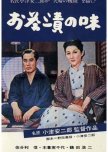The trick is a light touch.
I saw this comment on Letterboxd and it explains the beauty of this film
There’s a value in simplicity, a happy-sad acceptance of basic pleasures as pleasures nonetheless. Ozu uses his own light touch to make this much obvious in his peppering of choice little movements, a repeated note or a symmetry in the rhythm to really drive home the cadence of his bittersweet melody. Parallels of the old and the new strike a complementary tone to the content and the indifference, as reflection of the past blend visions of what could be, and even empty corridors round out a harmony heard half-way, in happy-hushed hallways. It’s almost too easy to label this approach the same unassuming, gentle compromise as the very dish it's named after. As a figuration for marriage itself, The Flavor of Green Tea Over Rice is as sound as they come. It’s the taste of simplicity, yes, but also a gesture of their meeting in the middle, a soft-spoken pact that love can come at last sight.
As an exercise in melodrama, I’m less convinced. Ozu was never afraid to bare teeth, and the dynamics at play give him plenty to chew on. Certain scenes had me sold on the belief that this was his social satire as disguised in clothing of the home family drama, in its challenges of culture divides and exposing of societal hypocrisies, warts and all. And yet, there’s one too many smiles to make the bite ever truly sting, as the piece contorts from seeming damnation to gentle epiphanies, while gentle jabs at human frailties are balanced by a soothing sympathy for human conduct. As mirrored in the slightest of camera-tilts, Ozu manages a soft-blow knockout in the most unassuming of digressions, minor-key enjoyment epitomized and granted wings. With a grace note so abrupt it left me gasping for air, it’s as if we’re reminded that the smallest moments are often the simplest pleasures.
There’s a value in simplicity, a happy-sad acceptance of basic pleasures as pleasures nonetheless. Ozu uses his own light touch to make this much obvious in his peppering of choice little movements, a repeated note or a symmetry in the rhythm to really drive home the cadence of his bittersweet melody. Parallels of the old and the new strike a complementary tone to the content and the indifference, as reflection of the past blend visions of what could be, and even empty corridors round out a harmony heard half-way, in happy-hushed hallways. It’s almost too easy to label this approach the same unassuming, gentle compromise as the very dish it's named after. As a figuration for marriage itself, The Flavor of Green Tea Over Rice is as sound as they come. It’s the taste of simplicity, yes, but also a gesture of their meeting in the middle, a soft-spoken pact that love can come at last sight.
As an exercise in melodrama, I’m less convinced. Ozu was never afraid to bare teeth, and the dynamics at play give him plenty to chew on. Certain scenes had me sold on the belief that this was his social satire as disguised in clothing of the home family drama, in its challenges of culture divides and exposing of societal hypocrisies, warts and all. And yet, there’s one too many smiles to make the bite ever truly sting, as the piece contorts from seeming damnation to gentle epiphanies, while gentle jabs at human frailties are balanced by a soothing sympathy for human conduct. As mirrored in the slightest of camera-tilts, Ozu manages a soft-blow knockout in the most unassuming of digressions, minor-key enjoyment epitomized and granted wings. With a grace note so abrupt it left me gasping for air, it’s as if we’re reminded that the smallest moments are often the simplest pleasures.
Was this review helpful to you?






















